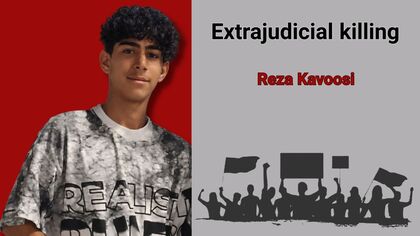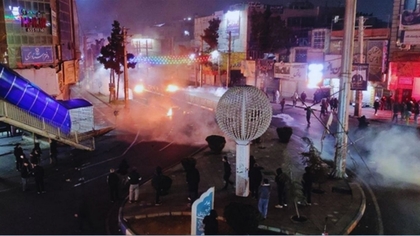Iran criticised over capital punishment 'killing spree'
20:20 - 15 December 2011

Iran has escalated its use of the capital punishment to what has been called \"a killing spree of staggering proportions\" in an effort to contain drug-related crimes amid concerns about the west\'s continuing support for the regime\'s anti-narcotics campaign, according to a report.
Amnesty International warned of \"a new wave of drug offence executions\" in Iran in a report published on Thursday, which highlights the country\'s extensive use of the death penalty, especially in a series of public and secret hangings.
According to the report, at least 600 people were executed in Iran from the beginning of 2011 up to the end of November, of which a minimum of 488 executions were carried out for alleged drug offences.
Amnesty said the figures showed a threefold increase in comparison to drug-related executions it documented in 2009. \"Members of marginalised groups – including impoverished communities, ethnic minorities suffering discrimination, and foreign nationals, particularly Afghans – are most at risk of execution for drugs offences,\" it said.
Iran\'s judicial system has been criticised for holding \"grossly unfair trials\" in a majority of the cases. Many trials are reported to have been held behind closed doors without the presence of a defence lawyer and families have not been given prior notice of the execution.
Iran is a neighbour to Afghanistan, a leading producer and supplier of the world\'s drugs. As for the Afghans imprisoned in Iran for drug offences, Amnesty said it appears they are \"particularly poorly treated\" and as many as 4,000 of them are believed to be on death row.
The sharp rise in the number of drug offence executions in Iran comes at a time when the international community, especially many European countries, including Germany, Belgium, France, Ireland and Britain, continues to provide the Islamic republic with financial and technical support for its anti-drug campaign.
Paradoxically, many of these countries have repeatedly condemned executions in Iran while praising its achievements in the anti-drug field. According to Amnesty, the EU has provided Iran with €9.5m over three years and the UN office for drugs and crime (UNODC) has also given the country £14m since 2005 for its anti-narcotics campaign.
Many activists have raised concerns in recent years about the west\'s support for Iran. Fazel Hawramy, the editor of Kurdishblogger.com, who has campaigned on the issue, said Iran has received \"body scanners, drug detecting kits, drug catalysts, sniffer dogs, vehicles, night-vision devices and radio communication equipment\" as part of the west\'s support despite international sanctions.
\"It cannot be ruled out that some of this equipment was used by the police to crush the pro-democracy demonstrations in 2009,\" wrote Hawramy in an article published by the Guardian earlier this month.
\"All countries and international organisations helping the Iranian authorities arrest more people for alleged drugs offences need to take a long hard look at the potential impact of that assistance and what they could do to stop this surge of executions,\" said Ann Harrison of Amnesty. \"They cannot simply look the other way while hundreds of impoverished people are killed each year without fair trials, many only learning their fates a few hours before their deaths.\"
Activists fear that Iran might have executed political prisoners and activists among those killed secretly for drug offences. In one example in the city of Mashhad, at Vakilabad prison, Amnesty has received reports of secret mass execution involving 89 individuals in August 2010.
In recent years, many Iranian activists and lawyers have fallen foul of the Iranian regime for highlighting Iran\'s high rate of executions. Nasrin Sotoudeh, a prominent human rights lawyer, is currently kept in Tehran\'s notorious Evin prison after being arrested in September 2010 for speaking out on the execution of juvenile offenders in Iran.
A Foreign Office spokesman said: \"The UK has contributed to the UN\'s Iran country programme, with the majority of funding in recent years being given in 2007. Work funded included a variety of projects including a project to reduce demand for drugs and a project to improve capacity to tackle money-laundering.
\"We take the human rights implications of our counternarcotics work very seriously and human rights are a central consideration in all decisions. We are opposed to the use of the death penalty in all circumstances including for drugs offences, and have made our views on this matter absolutely clear. We have regularly raised our concerns with the Iranian regime about its human rights record including its appalling use of the death penalty as evidenced in this Amnesty report.
\"More broadly, the illegal drugs trade causes huge damage to the UK and to countries all around the world. The UK\'s overseas work in tackling this threat involves a range of activities including improving policing and law-enforcement standards and promoting best practice.\"
By - Saeed Kamali Dehghan, guardian.co.uk
Amnesty International warned of \"a new wave of drug offence executions\" in Iran in a report published on Thursday, which highlights the country\'s extensive use of the death penalty, especially in a series of public and secret hangings.
According to the report, at least 600 people were executed in Iran from the beginning of 2011 up to the end of November, of which a minimum of 488 executions were carried out for alleged drug offences.
Amnesty said the figures showed a threefold increase in comparison to drug-related executions it documented in 2009. \"Members of marginalised groups – including impoverished communities, ethnic minorities suffering discrimination, and foreign nationals, particularly Afghans – are most at risk of execution for drugs offences,\" it said.
Iran\'s judicial system has been criticised for holding \"grossly unfair trials\" in a majority of the cases. Many trials are reported to have been held behind closed doors without the presence of a defence lawyer and families have not been given prior notice of the execution.
Iran is a neighbour to Afghanistan, a leading producer and supplier of the world\'s drugs. As for the Afghans imprisoned in Iran for drug offences, Amnesty said it appears they are \"particularly poorly treated\" and as many as 4,000 of them are believed to be on death row.
The sharp rise in the number of drug offence executions in Iran comes at a time when the international community, especially many European countries, including Germany, Belgium, France, Ireland and Britain, continues to provide the Islamic republic with financial and technical support for its anti-drug campaign.
Paradoxically, many of these countries have repeatedly condemned executions in Iran while praising its achievements in the anti-drug field. According to Amnesty, the EU has provided Iran with €9.5m over three years and the UN office for drugs and crime (UNODC) has also given the country £14m since 2005 for its anti-narcotics campaign.
Many activists have raised concerns in recent years about the west\'s support for Iran. Fazel Hawramy, the editor of Kurdishblogger.com, who has campaigned on the issue, said Iran has received \"body scanners, drug detecting kits, drug catalysts, sniffer dogs, vehicles, night-vision devices and radio communication equipment\" as part of the west\'s support despite international sanctions.
\"It cannot be ruled out that some of this equipment was used by the police to crush the pro-democracy demonstrations in 2009,\" wrote Hawramy in an article published by the Guardian earlier this month.
\"All countries and international organisations helping the Iranian authorities arrest more people for alleged drugs offences need to take a long hard look at the potential impact of that assistance and what they could do to stop this surge of executions,\" said Ann Harrison of Amnesty. \"They cannot simply look the other way while hundreds of impoverished people are killed each year without fair trials, many only learning their fates a few hours before their deaths.\"
Activists fear that Iran might have executed political prisoners and activists among those killed secretly for drug offences. In one example in the city of Mashhad, at Vakilabad prison, Amnesty has received reports of secret mass execution involving 89 individuals in August 2010.
In recent years, many Iranian activists and lawyers have fallen foul of the Iranian regime for highlighting Iran\'s high rate of executions. Nasrin Sotoudeh, a prominent human rights lawyer, is currently kept in Tehran\'s notorious Evin prison after being arrested in September 2010 for speaking out on the execution of juvenile offenders in Iran.
A Foreign Office spokesman said: \"The UK has contributed to the UN\'s Iran country programme, with the majority of funding in recent years being given in 2007. Work funded included a variety of projects including a project to reduce demand for drugs and a project to improve capacity to tackle money-laundering.
\"We take the human rights implications of our counternarcotics work very seriously and human rights are a central consideration in all decisions. We are opposed to the use of the death penalty in all circumstances including for drugs offences, and have made our views on this matter absolutely clear. We have regularly raised our concerns with the Iranian regime about its human rights record including its appalling use of the death penalty as evidenced in this Amnesty report.
\"More broadly, the illegal drugs trade causes huge damage to the UK and to countries all around the world. The UK\'s overseas work in tackling this threat involves a range of activities including improving policing and law-enforcement standards and promoting best practice.\"
By - Saeed Kamali Dehghan, guardian.co.uk



